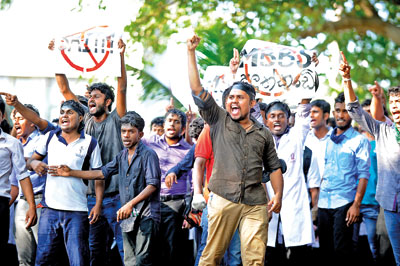Public fed up with strikes, protests, poll reveals
View(s):Various comments were received in the twin polls conducted by the Business Times and its polling partner, Second Curve on strikes and protests with many saying that these need to be restricted and the Armed Forces brought to run essential services during a crisis. While the Business Times poll result is being published, the Second Curve street poll result will be published next week.

File picture of a protest in Colombo.
Here is a synopsis of comments received on email:
- All services that are maintained by the government and salaries of employees which are paid by the government, should be declared as essential services and such employees should not be granted the right to strike.
- Trade unions are taking undue and unfair advantage of the freedom given to the people to protest, to strike and to voice their grievances. Eventually it is the ordinary public who suffers. The Armed Forces should be trained and immediately mobilized to run transport services during transport strikes and health services during doctors’ strikes, etc to break the back of the strikers.
- A solution to stop the demonstrations would be to allocate a separate venue that would not cause annoyance and harassment to the general public and restrict all demonstrations within that venue and legally ban demonstrations on public highways. If that is done, after a while, there won’t be any demonstrations on the public highways as the demonstrators would realise that no one is interested and no one is inconvenienced by the demonstrations in the “Strikers Venue”.
- The government should hold discussions with strikers but should not try to suppress strikes.
- While freedom of movement and speech is needed, it seems to be going way out of line. The strikers are not concerned about constantly inconveniencing the general public. Firm action is necessary.
- “Dealing firmly’ should not mean suppressing strikes. Often, strikes are legitimized by long standing anomalies that have not been rectified or addressed by successive Governments…eg postal strike recently (their demands have been simmering since 2005). ‘Dealing firmly’ requires quick dialogue between all parties and either a solution or a framework leading to a solution must result. The state should have a dedicated team to handle this, drawing on expertise in the different areas of contention and ‘voices of reason’ as well.
- Continuing essential services during a strike should be devised with the support of the Armed Forces, Police, retired personnel, manpower companies, private security companies and, as the last option, overseas workers flown in on an emergency basis. Once the bargaining power of the strikers are dismantled, it’s easy for negotiations.
- Most of these essential services lack a customer orientation. Go to the Fort Railway Station, where there is no cleanliness in the station or the trains and computer departure and arrival times are more often wrong. These services should be sub-contracted. The focus seems to avoid breakdowns only while ticketless travel is rampant. I wonder if the Railway is recovering even the fuel costs .The need for 1st and 2nd class at realistic-rates must be looked at. Railway land on the coastal tracks are a mess of old concrete sleepers and rails rotting which need urgent attention. A better run railway will ease traffic congestion. Reduce buses and increase trains.
- Basically employing the Armed Forces is not advisable in a vibrant democracy.
- It is the manner in which strikes are held that draws criticism. For example, the train strike which was done at the last minute without giving prior notice is inexcusable.
- Even in instances where the grievances may be real, how have they surfaced only during this Government’s term? The irony is that while these strikes add to the general feeling that the Government is losing control, the unions whose actions may ultimately lead to a regime change will then have to go silent, as they were during the Rajapaksa reign.
- Striking should be the last option after following and failing in the due process. Now the practice is to bring the last option as the first /immediate option. For instance, bus operators declared a snap strike by 12 midnight after 7 pm on a weekday inconveniencing millions of workers, school children and other commuters including patients.
- No doubt some of the striking workers are entitled to some pay revision and the Government has already indicated that an overall review of the salary structure is to be done soon. This is the best way to settle disputes rather than make ad hoc promises as done in the past. Having said that many of the demands are totally unrelated. Health services and government doctors in particular seem to have forgotten their Hippocratic Oath. It’s a pity that having received free education from primary school through to their professional qualifications, their own insecurities make them feel that they have a right to continue to demand for more and get involved in areas outside their own!
- Are strikes being led by the actual parties aggrieved, or have thugs, vandals and vagrants been drafted in to cause trouble? Again, one must examine what striking parties define as ‘democracy’? Is it ‘democratic’ to dredge up issues that have not been addressed by previous Governments and, fuelled by political partisanship, and now parade them on the streets to the public’s inconvenience?
- Unions should not resort to acts that would harmful and or disturb the general public, including those who use government facilities.
Synopsis of comments from street poll
| |


